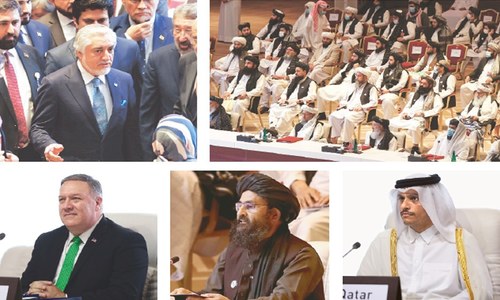WASHINGTON: Former US secretary of state Mike Pompeo has blamed Ashraf Ghani, who served as Afghan president, for failing the US-led peace process and landing his people into trouble.
Speaking at the University of Chicago earlier this week, Mr Pompeo explained how the US wanted its negotiations with the Taliban to be a years’ long process that would have led to a peaceful transfer of power in Kabul. But it did not happen because Ghani did not want it to succeed.
Mr Pompeo served as the CIA director and secretary of state in the Trump administration and supervised the US-Taliban talks that began in Doha, Qatar, in 2018.
Questioned if he had asked Mr Ghani to step down, Mr Pompeo said: “Well, he would think I did but I didn’t. I was incredibly frustrated with President Ghani.”
Says unlike Zelensky, ex-Afghan president chose to flee to safety
Explaining how the US started the peace process, he said: “It took us to step in and finally get all the Afghans to the negotiating table.”
Since Mr Ghani ‘didn’t like that the US convened with the Taliban” and that’s why he opposed the deal as well.
Asked how he liked talking to the Taliban, Mr Pompeo said a deputy Taliban leader that he met in Doha “almost certainly killed a friend of mine. That’s hard stuff, to walk into a room negotiating with someone that killed someone that you loved, but it mattered for America to get that right.”
The US, he said, succeeded in bringing every group to the table. “We had the Northern Alliance there. We had women’s rights groups there. We had human rights groups there.”
The Trump administration, he said, was “hopeful that we had begun to head down that road. But it was going to take some American presence there to do it.”
But President Ghani, he said, was not up for that. “And that was most unfortunate because in the end you see what happens. Unlike Zelensky, who chose to stay, President Ghani hops on an aeroplane and heads to some place to go, live a very nice, peaceful life.”
Published in Dawn, January 15th, 2023
















































